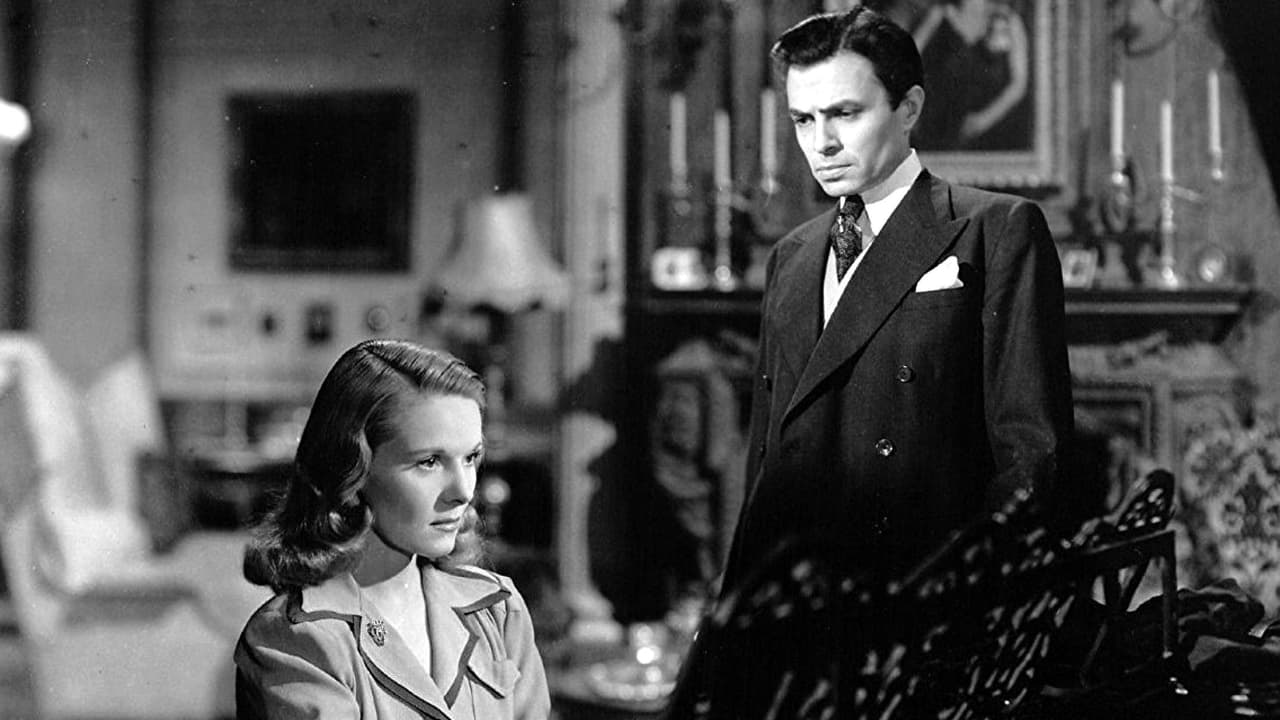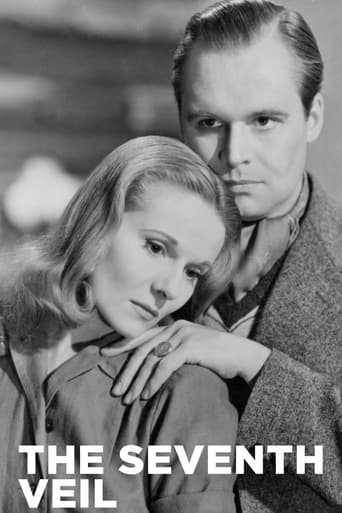

People are voting emotionally.
... View MoreFar from Perfect, Far from Terrible
... View MoreDon't listen to the negative reviews
... View MoreThe film may be flawed, but its message is not.
... View MoreWhoever thought control could look so handsome? In The Seventh Veil, Ann Todd comes under the control of her music teacher and guardian James Mason, and even though he's incredibly overwhelming, he's also incredibly handsome. He insists she devote her entire life to her piano playing and prevents her from having any form of a social life. As in many stories of this kind, the well-intentioned trainer becomes overbearing, and the meek pupil loses it.Ann Todd is very convincing as weak and meek, and James Mason is very convincing as being intense and controlling. When the main characters are written and performed well, you're off to a good start. This isn't normally my favorite time of love story, but since James Mason is so handsome, it's easy to forgive him and hope he gets the girl. Give it a watch and see if you agree!
... View MoreIf ever a film defined Terence Rattigan's assertion that the 'English Disease' is repression then this is it. Here we have two not one leading players both repressed to the nth degree. It's fluff and nonsense of course but amazingly entertaining with it. James Mason could almost have written the part of Nicholas himself. There are, of course, the odd hiccups; why, for example, if she is bent on suicide, does Todd's Francesca, take the trouble to waste several minutes eluding hospital staff and then make her way to a river/canal instead of just opening a vein in situ. This cavil apart we are left with a very 'period' melodrama which still holds up if you're prepared to meet it half way.
... View MoreSeven veils ago, I saw this film, and here it is again, all wrapped up in its mystery once more. The lead performances by Ann Todd and James Mason are so good that the whole film sweeps you away with its rather implausible story. No wonder it got an Oscar for best original screenplay by the Two Boxes (Muriel and Sydney Box, a famous cinematic couple, Sydney also being the producer of this film), and is one of the ten most popular British films of all time, according to a survey. This film also launched Herbert Lom's career onto a higher level, because he was so reassuring and calm as the hypno-therapist who treats Ann Todd that everyone wanted to run to him with their troubles, or at least see more of him on the screen, which was almost as good. Once again, we see the Scottish actor Hugh McDermott (1906-1972) playing an American, which he did so often everybody thought he really was one. (Of course, it is anatomically impossible for a Scot to be an American, as everybody knows, unless they have their kilts surgically removed at birth, that is.) Muir Mathieson not only conducts the orchestra (the London Symphony Orchestra) but is actually seen to conduct the orchestra, for this is a film about a musician, namely Ann Todd herself, a tormented concert pianist who has lots of veils smothering her oppressed psyche and who is worried about her hands ever since a sadistic headmistress caned them at school just before a music exam, causing her to fail it and miss a music scholarship. And as one sensationalist poster advertising this film in 1945 stated: 'It dares to strip bare a woman's mind.' Well, that is a terrifying thought to us men, for what might we find there? And surely it is impolite to remove veil after veil like that, ending up with the seventh and last, beneath which we will at last understand her, not to mention what we might see. You know what we men are like about wanting to lift veils and have a peek. When I was four, I used to peek under the skirt of a girl at school named Rita to see what colour knickers she was wearing, as she changed colours every day. I would then shout out to the class: 'They're blue today!' or 'They're pink today!' What fun. It was also such fun to tease her, as she was rather stuck on herself and was always flouncing around self-importantly. But this film is in black and white, so we can't tell what colour knickers anybody at all is wearing. And in any case, in 1945, there were no scenes which showed them anyway. Sydney Box in 1957 produced an amusing film entitled THE TRUTH ABOUT WOMEN, with Larry Harvey. So you see, Box spent years trying to understand them, and even with all the help his wife could give him, I wonder if he ever succeeded. Most of us chaps are still exploring this mysterious subject, except for the ones who bat for the other side, of course, to whom women are objects of indifference, which is such a pity and such a waste of pulchritude. ('Pulchritude' was Charlie Chaplin's favourite euphemistic word, a nod in the direction of gentility. Look it up.) This film is very much a melodrama in the high style. Ann Todd is left an orphan in her teens and her only living relative is James Mason, a second cousin. He reluctantly takes her in, but has an inveterate hatred of women. He is continually looking accusingly at the oil portrait of his deceased mother, which hangs over the mantel of the drawing room, so that gives us a clue. He is extremely rich and lives in a kind of small palace in London. He walks with a pronounced limp, aided by a stick. He barely speaks to Todd, having contempt for her because she is female. He often disappears for weeks on end without explanation, and he turns up late at night in top hat and tails, having been at Pratt's perhaps, and God knows what opera before that, on his own of course, as he is a solitary figure. All the servants in the house are men. If it were not 1945, when no such thing existed, we might even suspect him of being gay. But his attitude towards Todd changes entirely when he discovers that she can play the piano excellently well. For he is a classical music fanatic. He plays, but not well enough. It occurs to him that he can realize his passion for the piano by nurturing the genius of his ward, so he spares no trouble, sends her to the Royal College of Music (some scenes are shot there, and Ann Todd spent three months there preparing to play her role), and is always by her side for the five hours a day that she practices, obsessively promoting her career. She becomes a famous pianist, plays Rachmaninoff concerti and so forth in flowing dresses. Ann Todd herself could play the piano, and there are many scenes where she is really doing it, which are most impressive. For the final sound track, however, Eileen Joyce recorded the pieces. She is the same person who played all that Rachmaninoff on the sound track of David Lean's BRIEF ENCOUNTER of this same year. This is essentially a psychological melodrama, so the psyches of Mason and Todd are the centre of our concern. They are both deeply disturbed people. And what will come of all this? Especially when men start to enter Ann Todd's life? Mason takes that very badly. The rules of IMDb reviewing forbid discussion of the ending, so it is not possible to go into what happens when the seventh veil is lifted by the determined Herbert Lom, with his relentless hypnotherapy sessions. But it is certainly all very dramatic indeed.
... View MoreHerbert Lom played the principal part as a psychiatrist, in a successful 1960s British TV series called "The Human Jungle".I feel sure he got this part from his resume in "The Seventh Veil"(1945) playing the role of Dr. Larsen the psychiatrist who unravels the mental problem which plagues a suicidal Ann Todd (Francesca Cunningham).I have a love of films which portray great dexterity at playing classical music.In my collection are Margaret Lockwood in "Love Story" (1944) and John Garfield in "Humoresque (1945), I even liked Cornel Wilde playing Frederic Chopin!Once again Eileen Joyce is called upon to provide the authentic classical piano music heard on the soundtrack.Featured pieces she plays include: the Grieg piano concerto in A, the Pathetique sonata, 2nd movement, by Beethoven, the Brahms lullaby and the Rachmaninov piano concerto no.2 in c minor which she also played as a backdrop to "Brief Encounter (1945).The music is under the expert direction of Muir Matheson with the London Symphony Orchestra.Other reviewers have described the plot adequately so just a few additional notes on the acting.Psychiatry was a popular theme with film makers in the 1940s c.f."Spellbound" with Gregory Peck and Ingrid Bergman (1945) and it features as a means to rescue a suicidal Ann Todd.She plays the role with a rather expressionless demeanor throughout.Was this because she was directed to play it this way by her director as her character was being totally dominated by her guardian and 2nd cousin Nicholas, as played by a dark, brooding and menacing James Mason?She did however act playing the piano pieces effectively.Did Eileen Joyce give Ann some backstage tutoring to give authenticity to her "playing"?The denouement when Francesca is cured by Dr Larsen and has to choose one of her three male friends is, I agree with a previous reviewer, a bit "Mills & Boon".Overall I enjoyed this film and rated it 6/10 mainly because of the wonderful classical music played.
... View More